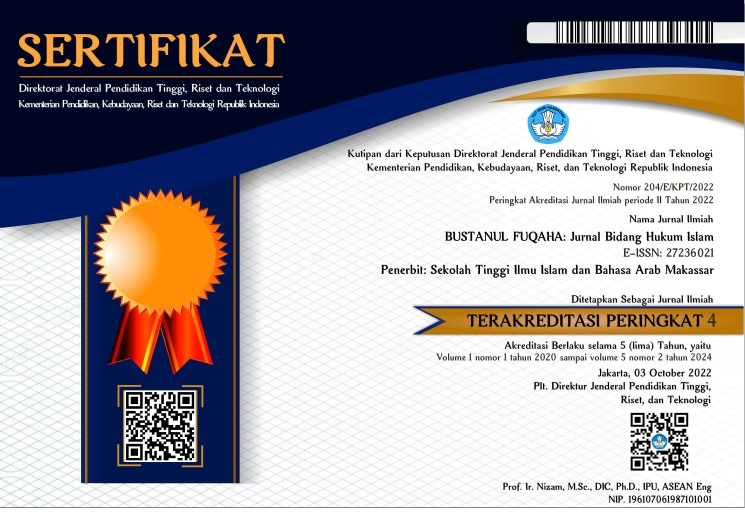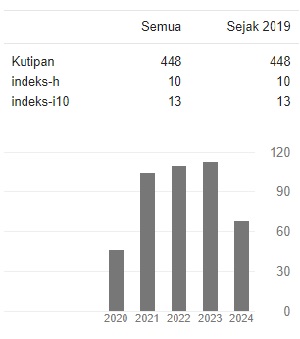Hukum Pelaksanaan Salat Tarawih di Rumah Karena Wabah dan Membaca Al-Qur’an Melalui Mushaf dan HP Ketika Salat
DOI:
https://doi.org/10.36701/bustanul.v1i2.150Keywords:
Tarawih, home, mushaf, mobile phone, Covid-19Abstract
This study aimed to provide explanation and overview related to the law of tarawih prayers at home in an pandemic situation (Covid-19), the law of performing prayers at home with the intention of participating in congregation in the mosque, and the law of reciting the mushaf or mobile phones while leading tarawih prayer. This research used a descriptive qualitative approach using content analysis techniques and library research. The results show that if in an area where the potential for outbreaks of the covid-19 outbreak is high and there has been an appeal from the local government and scholars (MUI), then in these state the more important thing is to perform tarawih prayers at home, both congregationally with family members, and this is the preferred, or individually; (2) invalidity of the prayers of a person who follows the congregational prayers outside the mosque building, where the scholars agree that he must go to the mosque; and (3) it is permissible to recite from the mushaf in the sunnah (optional) prayers, such as tarawih prayer for imams who do not memorize the Koran. As for the obligatory prayers, it is disliked because there is no need to do so. This law also applies to someone who wants to recite the Koran with the software of Koran on mobile phones.
Downloads
References
Abu Dawud. (1430). Sunan Abi Dawud, Juz II. Cet. I; Dar al-Risalah al-‘Alamiyah, h. 525.
Al-Bukhari. (1422). Sahih Bukhari, Juz VIII. Cet. I; Dar Tauq al-Najat, h. 6113.
Al-Kasani. (1986). Badāi’ al-Sanāi’ fi Tartib al-Syarāi’, Juz 1. Beirut: Dar Kutub Ilmiyah, h. 541-641.
Al-Marginani. al-Hidayah fi Syarah Bidayah al-Mubtadi, Juz I. Beirut: Dar Ihya Turats, h.63.
Al-Mawardi. (1994). Al-Hawi al-Kabir Syarh Mukhtasar al-Muzani, Juz 2. Beirut: Dar Kutub Ilmiyah, h. 343.
Al-Nawawi. al-Majmu’ Syarah al-Muhadzdzab, Juz III. Dar al-Fikr, h. 492.
Al-Qarafi. (1994). al-Dzakhirah, Juz II. Cet. I; Beirut: Dar al-Garb al-Islamy, h.408.
Al-Sarakhsi. (1993). al-Mabsuth, Juz I. Beirut: Dar al-Ma’rifah, h.201.
Al-Syirazi. (2003). al-Luma’ fi Ushul al-Fiqh, Cet. II; Beirut: Dar al-Kutub al-‘Ilmiyyah, h. 53.
Ibnu Abi Syaibah. (1409). al-Mushannaf, Juz II. Cet. I; Riyadh: Maktabah al-Rusyd, h. 166.
Ibnu Hajar. (1379). Fathul Bari Syarah Sahih Bukhari, Juz II. Beirut: Dar al-Ma’rifah, h. 215.
Ibnu Quddamah. (1388). al-Mugni, Juz II. Kairo: Maktabah al-Qahirah, h. 123.
Iskandar, A., Aqbar, K. Kedudukan Ilmu Ekonomi Islam di Antara Ilmu Ekonomi dan Fikih Muamalah: Analisis Problematika Epistemologis. Nukhbatul ‘Ulum: Jurnal Bidang Kajian Islam, Vol. 5, No. 2 (2019), h. 88-105.
Lajnah Daimah. Fatawa Lajnah Daimah, Juz VIII. Riyadh: Riasah Idarah al-Buhuts al-‘Ilmiyyah wal Iftaa, h.214.
Malik. (1994). Al-Mudawwanah al-Kubra, Juz 1. Beirut: Dar Kutub Ilmiyah, h. 175-176.
Muslim. Sahih Muslim, Juz I. Beirut: Dar Ihya al-Turats, h. 539.














